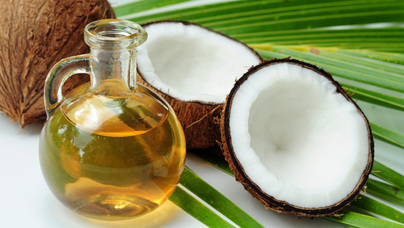*** A personal note *** Coconut oil and cardiovascular health - this has been a long time coming. As an integrative dietitian, this is a topic I've hesitated to poke around in. I have my own conclusions about coconut oil, based on the most recent systematic reviews of the literature - I am convinced that coconut oil can be a healthy addition to a balanced, wholefoods diet and is not only a great source of energy but also medicinal in some aspects.
But for reasons I am not entirely sure of, the current nutritional guidelines prescribed by government, heart health and medical authorities do not yet reflect this most recent and highly reputable evidence. This has placed me in a tricky area - do I stick to the current paradigm or go on what logic and current science is telling me? I have chosen the latter because I believe that as scientists, we should be using the most solid, recent research available to us. And the research on coconut oil and saturated fat is rapidly changing, even though the guidelines appear not to be keeping up. So here it is - my opinion in black and white, a matter very close to my heart. I have cited some research here but have plenty more for those who would like to request it. A groundswell of change is occurring in the fields of functional nutrition, and I know I am not the only dietitian with these conclusions.
Like all oils, coconut oil is 100% fat - more than 85% of that being saturated fat. The conversation on whether saturated fat increases the risk of cardiovascular disease (CVD) is a highly controversial one. Although most in the mainstream heart-health, government, and medical communities maintain that saturated fat is a risk factor for CVD, recent studies and systematic reviews in reputable medical journals have produced very conflicting results. Read on for a closer look at the evidence for and against coconut oil for cardiovascular health, and make up your own mind based on current, not outdated, science.
The argument against coconut oil
Some health authorities proclaim that coconut oil is bad for cardiovascular health, based on a lauric acid extract study as an associated justification. Lauric acid is one of several types of medium-chain fatty acids (MCFAs) in coconut oil.
However, no evidence exists to support the notion that coconut oil in its wholefood form leads to an increase in CVD. It is an interesting phenomenon in science that sometimes, a fraction of the whole does not behave in the same way as the whole. Take beta carotene, an antioxidant and rich source of Vitamin A from many brightly coloured fruits and vegetables. When beta carotene is extracted from whole food it has very little protective effect, in fact quite the opposite, it can be harmful! As an extract, isolated from whole food, it performs poorly as an antioxidant and different from its role when part of a complete diet.
Similarly, when lauric acid is delivered as an isolate in controlled studies without accompanying phytonutrients, its cholesterol-raising effects are amplified and more importantly its real impact on the potential for CVD is overemphasised, which seems to give support to the consensus belief that saturated fatty acids increase risk of CVD. Validity of this correlation in the laboratory doesn’t extrapolate to causality in the real world, but it is a convenient story for those holding fast to the predominant way of thinking which quite frankly is based on some very outdated and/or non-conclusive studies.
Coconut oil’s popularity appears to be a new trend, but the truth is coconut oil has been a traditional staple in tropical regions of the world for thousands of years. Since it doesn’t seem overly helpful to look at individual constituents of coconut oil under the microscope, perhaps we should look to epidemiological or population studies for some answers. In some traditional cultures coconut oil is used as a primary source of energy. There is no direct epidemiological support based on regional populations that supports the idea that coconut oil is bad for CVD.
Saturated fats have been used in the diets of many tropical populations for centuries, as in other cultures. The French Paradox talks freely about saturated fats and antioxidants, the Mediterranean Diet talks about monounsaturated fats but understands the role of antioxidants. It makes sense that coconut oil as part of a traditional equatorial diet also delivers a high intake of antioxidants in the form of fruit and vegetables, thus reducing any direct impact on CVD. Consequently, under natural circumstances, coconut oil as part of an “Equatorial Paradox” does not seem to increase CVD levels. Maybe that’s why you can’t find a single published study supporting the idea that diets based on coconut oil as part of a traditional regional diet (not affected by Western culture) increase the risk of CVD. Studies of tropical cultures that have been infiltrated by western culture with processed trans-fatty acids suggest that dietary saturated and trans fatty acids and dietary cholesterol are important determinants of differences in population rates of coronary heart disease death, not dietary saturated fats alone (1).

A closer look at coconut oil
Authorities in mainstream heart health, government and medicine are aware of coconut oil’s high saturated fat content (around 86-87 per cent saturated fat), and dismiss coconut oil based on the premise that foods rich in saturated fat are linked with a higher risk of heart disease. But are the saturated fats in coconut oil actually linked with higher CVD risk? To answer that, we need to look more closely at the fats in coconut oil.
One of the oil’s most interesting characteristics is that 65% of its fats are present in the form of medium-chain fatty acids (MCFAs), as opposed to long-chain fatty acids (LCFAs) commonly found in other food sources of fats.
MCFAs have only eight to 14 carbons in length. Unlike other fats, MCFAs don’t need to break down into single fatty acids for the body to absorb them. Rather, MCFAs make their way directly to the liver through the portal vein and can bypass the carnitine transport system for mitochondrial entry (2).
As dietitians, we already support the health benefits of coconut oil without really even knowing it! Dietitians know that MCFAs are extremely beneficial in our tube-feeding patients as a source of energy, as these oils are absorbed directly into the portal system without the use of bile. This means it would be just as easy to absorb for everyday people as well.
About 49% of the MCFAs in coconut oil is lauric acid (12:0) while the rest of the fats include 8% caprylic acid (8:0), 7% capric acid (10:0), 6% oleic acid (18:1), 2% stearic acid (18:0), and 2% linoleic acid (18:2) (3). Coconut oil’s fatty acid profile makes it highly stable, protecting it from oxidative and heat damage. Being mostly saturated, some nutritionists and dietitians believe coconut oil is an optimal fat for cooking, since the fats aren’t easily damaged by heat.
Lauric acid is also recognised for its antimicrobial properties. When lauric acid infiltrates the membranes of lipid-coated bacteria or other microbes such as fungi, protozoa, and even viruses, it destabilises their membranes, causing them to disintegrate, and kills the microbes as a result. However, this process can occur only in the presence of sufficient blood concentrations of lauric acid found in whole coconut oil (4).
Despite the research, however, most dietitians don’t feel comfortable recommending that clients consume coconut oil because of its high saturated fat content. But it’s important to remember there’s an elephant in the room. Recent scientific reviews including a meta-analysis published in the March 2010 issue of the American Journal of Clinical Nutrition conclude that dietary saturated fats aren’t actually associated with heart diseases and stroke. The researchers examined data from almost 350,000 people who were followed up to 23 years. The study showed there was no relationship between saturated fat intake and the risk of cardiovascular diseases and stroke (5). Systematic reviews such as these are the highest and most reputable level of evidence in scientific research. Other recent reviews with similar findings starkly contrast the research of earlier decades – the same research that still dictates mainstream nutritional guidelines.
As this and other systematic reviews are beginning to suggest, fat (amount or type) is not the top driver of environmentally induced CVD. Rather, waistlines, salt, high glycaemic indices, pro-inflammatory gut bacteria, seated screen viewing, office chairs, stress and a lack of broad spectrum phytonutrients are a far more potent collection of CVD agonists than whether or not we consume coconut oil as a culinary extra. Maybe if the source of coconut oil also delivers supporting antioxidants e.g. virgin cold pressed extract, the potential as a CVD promotor is also reduced. These are the questions that need real answers.
Dietitian’s perspective
Considering the evidence that refutes the association between excess saturated fat intake and cardiovascular disease, in addition to the unique structure of the saturated fats found in coconut oil and the many studies supporting its safety in human health, dietitians should feel confident suggesting clients incorporate coconut oil into their diets, either as a substitute for other fats or as a supplemental source of healthy fats to encourage energy balance.
I like to think of coconut oil as an instant energy boost because it produces energy, not fat. It has been shown to increase metabolism, protect against diseases, increase immunity, and aid in killing bacteria and viruses. Coconut oil in moderation is a fantastic addition to a healthy diet, and I don't see a problem in recommending it to patients.
Based on the research, coconut oil should be considered a functional food. It provides a safe source of stable and easy-to-utilise fats, and research is finally beginning to show what we have suspected all along – that rather than damaging cardiovascular health, coconut oil may actually improve it. The easy digestibility of coconut oil makes it well suited to help treat various digestive disorders, such as irritable bowel syndrome, reflux, heartburn, and cholecystectomy, so it has its place as part of a healthy wholefood-based diet.
References
1. Kromhout D, Menotti A, Bloemberg B, Aravanis C, et al. Dietary Saturated and transFatty Acids and Cholesterol and 25-Year Mortality from Coronary Heart Disease: The Seven Countries Study. J Prev Med. 1995; 24(3):308–315.
2. Nagao K, Yanagita T. Medium-chain fatty acids: functional lipids for the prevention and treatment of the metabolic syndrome. Pharmacol Res. 2010;61(3);208-212.
3. Campbell-Falck D, Thomas T, Falck TM, Tutuo N, Clem K. The intravenous use of coconut water. Am J Emerg Med. 2000;18(1):108-111.
4. Enig MG. Know Your Fats: The Complete Primer for Understanding the Nutrition of Fats, Oils, and Cholesterol. Bethesda, MD: Bethesda Press; 2000.
5. Siri-Tarino PW, Qi Sun, Hu FB, and Krauss RM. Meta-analysis of prospective cohort studies evaluating the association of saturated fat with cardiovascular disease. Am J Clin Nutr. 2010;91(3):535–546.
More studies available on request.



































 RSS Feed
RSS Feed



